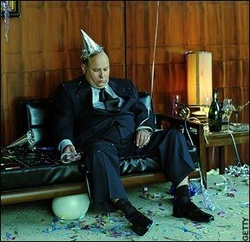
It’s that time of year again. The time when it seems like every other night you find yourself wandering the aisles of your local liquor store on your way to some coworker or friend or in-law’s house for dinner, staring open-mouthed at the infinite labels and trying to decide which $10 bottle of wine looks obscure enough that your host will never even find it in the most determined Google search let alone discover how much it cost. The time when getting totally shnackered and showing up to work drunk is pretty much a daily occurrence, and HR works overtime to mediate new, awkward relationships born of the infamous Holiday Office Party.
Yes, folks, this is the time of binge drinking and boozy gift-giving. Whatever your denomination, the entire month of December may as well be erased from history because it’s not like anyone every really remembers it anyway.
It was in this spirit that Champagne and Hotdogs created the first annual judgment-free holiday Q&A. It was your chance to ask any ridiculous wine-related question you could think of, beseech us for juicy advice and generally air your dirty, Merlot-stained laundry, anonymously. For the first time, you would not get verbally flogged by your stuffy Wine-Spectator-subscribing friends for not knowing the difference between Premier and Grand Cru, nor would you receive an eyeroll from your local wine merchant because you interrogated them for 30 minutes about the “nose” on that bottle of Santa Margherita. We were the Dan Savage of wine. You asked. We gave thoughtful, clever, only-very-mildly abusive responses. Here are some of our favorites:
Yes, folks, this is the time of binge drinking and boozy gift-giving. Whatever your denomination, the entire month of December may as well be erased from history because it’s not like anyone every really remembers it anyway.
It was in this spirit that Champagne and Hotdogs created the first annual judgment-free holiday Q&A. It was your chance to ask any ridiculous wine-related question you could think of, beseech us for juicy advice and generally air your dirty, Merlot-stained laundry, anonymously. For the first time, you would not get verbally flogged by your stuffy Wine-Spectator-subscribing friends for not knowing the difference between Premier and Grand Cru, nor would you receive an eyeroll from your local wine merchant because you interrogated them for 30 minutes about the “nose” on that bottle of Santa Margherita. We were the Dan Savage of wine. You asked. We gave thoughtful, clever, only-very-mildly abusive responses. Here are some of our favorites:
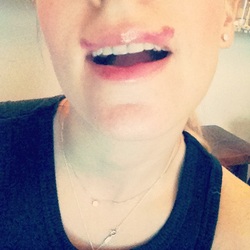
How do I avoid red wine teeth at parties?
There are several ways to avoid this. One is to drink white wine. Or, if you’re me, Champagne. But if you simply must have your holiday Cabernet, the obvious solution is to simply rinse with sparkling water between sips (or glasses). You can also stick to less inky wines – think Pinot Noir, Grenache, Gamay, Zweigelt, Lagrein and anything with an alcohol level under 13%. Oh, and seriously. Wipe your mouth. There is nothing more off-putting than chatting with someone sporting a wine mustache.
There are several ways to avoid this. One is to drink white wine. Or, if you’re me, Champagne. But if you simply must have your holiday Cabernet, the obvious solution is to simply rinse with sparkling water between sips (or glasses). You can also stick to less inky wines – think Pinot Noir, Grenache, Gamay, Zweigelt, Lagrein and anything with an alcohol level under 13%. Oh, and seriously. Wipe your mouth. There is nothing more off-putting than chatting with someone sporting a wine mustache.

What are the best late-night food pairings for hangover prevention?
Ever wake up next to a beer that has about one sip taken out of it, because the 15 you had before it simply weren’t enough and you just couldn’t go to bed without it? No? Ok, me neither. In any case, I hear water pairs amazingly well with Advil. Not quite the greasy binge you had in mind? I say go big or go home. Pizza and a bottle of Yellow Tail. Carne asada fries and more beer. You’re going to have a hangover anyway, so you may as well make it a good one. But if you do insist on being smart about your dumb decisions, think lighter style wines and good old fashioned artery-clogging, carb- and fat-heavy food. Better to go to bed with bacon than that 3 who magically turned into a 9 thanks to a few shots of Red Stag.
Ever wake up next to a beer that has about one sip taken out of it, because the 15 you had before it simply weren’t enough and you just couldn’t go to bed without it? No? Ok, me neither. In any case, I hear water pairs amazingly well with Advil. Not quite the greasy binge you had in mind? I say go big or go home. Pizza and a bottle of Yellow Tail. Carne asada fries and more beer. You’re going to have a hangover anyway, so you may as well make it a good one. But if you do insist on being smart about your dumb decisions, think lighter style wines and good old fashioned artery-clogging, carb- and fat-heavy food. Better to go to bed with bacon than that 3 who magically turned into a 9 thanks to a few shots of Red Stag.
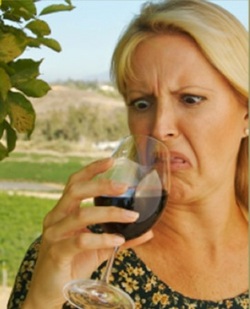
No really, what the hell is a ‘tannin’?
It’s what we do on a beach in a bikini (Eh oh! Ladies and gentlemen, I’ll be here all night). All comedy aside, we get this question at least once a day. In a very unhelpful nutshell, it is a polyphenolic compound found in red wine that comes from the stems, skins and seeds of the grape. Here are a few ways to get an idea of how to recognize tannins in wine:
The bottom line is that tannins have a drying effect on your mouth. Tannins can actually contribute to the longevity of many of the great wines out there, but, when left unchecked, can be somewhat unpleasant. And yet when they are balanced by acidity and body in wine, they can be magical. Some particularly thick-skinned grapes yield more tannic wines than others – for example, Cabernet Sauvignon Cabernet Franc and Nebbiolo. Others are generally lighter in tannin, or softer as we often say, like Pinot Noir, Syrah and Zinfandel. The main thing to remember is the astringency they create in a red wine. So stop going around and waxing poetic about how tannic your bottle of Santa Margherita was.
What is the best bottle of wine to give as a gift?
Well, that depends. Do you have a lot of money? If so, you really cannot go wrong with a bottle of Champagne. But this time, stick to “grower” Champagnes – you want your dollars to go toward the quality of the wine, not some massive wine house’s PR budget, right? Our favorites include Gatinois, Chartogne-Taillet and Vilmart. If you can’t afford fancy Champy, a bottle of Spanish Cava is an excellent option. It’s festive, it’s bubbly and it’s made in the same method as Champagne is (as opposed to, say, a bottle of Prosecco). You can find some fantastic Reserva and Gran Reserva options for a fraction of the price of an entry level bottle of Champagne. Can Feixes, Mont Marcal and Castillo Perelada make some stunning versions.
It’s what we do on a beach in a bikini (Eh oh! Ladies and gentlemen, I’ll be here all night). All comedy aside, we get this question at least once a day. In a very unhelpful nutshell, it is a polyphenolic compound found in red wine that comes from the stems, skins and seeds of the grape. Here are a few ways to get an idea of how to recognize tannins in wine:
- Go steep about four teabags in a cup of hot water for about 15 minutes and take a sip. Notice how dry and awful your mouth feels?
- Go take the stems from a bunch of grapes and chew them for a while. Notice how dry and awful your mouth feels?
- Go smoke a gang of weed. Notice how dry and awful your mouth feels?
The bottom line is that tannins have a drying effect on your mouth. Tannins can actually contribute to the longevity of many of the great wines out there, but, when left unchecked, can be somewhat unpleasant. And yet when they are balanced by acidity and body in wine, they can be magical. Some particularly thick-skinned grapes yield more tannic wines than others – for example, Cabernet Sauvignon Cabernet Franc and Nebbiolo. Others are generally lighter in tannin, or softer as we often say, like Pinot Noir, Syrah and Zinfandel. The main thing to remember is the astringency they create in a red wine. So stop going around and waxing poetic about how tannic your bottle of Santa Margherita was.
What is the best bottle of wine to give as a gift?
Well, that depends. Do you have a lot of money? If so, you really cannot go wrong with a bottle of Champagne. But this time, stick to “grower” Champagnes – you want your dollars to go toward the quality of the wine, not some massive wine house’s PR budget, right? Our favorites include Gatinois, Chartogne-Taillet and Vilmart. If you can’t afford fancy Champy, a bottle of Spanish Cava is an excellent option. It’s festive, it’s bubbly and it’s made in the same method as Champagne is (as opposed to, say, a bottle of Prosecco). You can find some fantastic Reserva and Gran Reserva options for a fraction of the price of an entry level bottle of Champagne. Can Feixes, Mont Marcal and Castillo Perelada make some stunning versions.

I want you to WANT to do the dishes!
My girlfriend gets really emotional and cries a lot when she drinks. How can I avoid this?
Ah, if I had a dime for every time I heard this… Here’s the deal, and trust me on this one: Talk to your girlfriend about her issues, insecurities and pent up frustrations frequently. Be a good listener and a proactive communicator. Solve problems in real time, instead of letting them pile up. Because when you let them pile up, all it takes is one glass of Chardonnay, and you’re suddenly gazing up at the heavens while she’s blubbering into her cocktail napkin about how you never take her out anymore, and why didn’t you hold the door for her that one time six years ago. The solution, however, is not – and I repeat not – to suggest to her, no matter how gently, that she perhaps lay off the juice until she can get control of her emotions. And you thought this was just a wine column…
Ah, if I had a dime for every time I heard this… Here’s the deal, and trust me on this one: Talk to your girlfriend about her issues, insecurities and pent up frustrations frequently. Be a good listener and a proactive communicator. Solve problems in real time, instead of letting them pile up. Because when you let them pile up, all it takes is one glass of Chardonnay, and you’re suddenly gazing up at the heavens while she’s blubbering into her cocktail napkin about how you never take her out anymore, and why didn’t you hold the door for her that one time six years ago. The solution, however, is not – and I repeat not – to suggest to her, no matter how gently, that she perhaps lay off the juice until she can get control of her emotions. And you thought this was just a wine column…
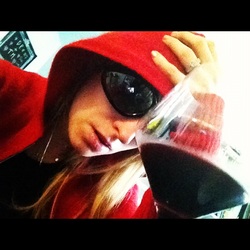
Please use your inside voice.
Which wines are less likely to give me a headache? What should I look to avoid?
The two most important things to avoid in wine if you would like to avoid a headache are alcohol and sugar. Notice what was not listed among those factors? Sulfites. Contrary to what an alarming number of wine drinkers believe, sulfites, while capable of causing respiratory symptoms in people with severe asthma, are not what’s giving you a headache, and the odds of you actually being allergic to them are really, really low. It has become strangely de rigueur to blame sulfites for every headache and post-binge-drinking barf-session, and to then go on a quest to find sulfite-free wine. There is a reason sulfite-free wine is so hard to find. It’s because it tastes like dirty bong water. Sulfites are added to wine as a preserving agent; without them, wine will oxidize easily, be prone to off-odors and have a shelf-life of about six months, and only under the most regulated and carefully monitored conditions (read: not your Ikea wine rack). Further, your average bottle of wine contains about as much SO2 as a piece of dried fruit. So, unless those prunes you eat for breakfast are also giving you a headache, chances are there is something else behind any adverse effects you are feeling from wine, namely a fun little thing called overindulgence. There has also been some study of histamines in wine contributing to headaches, but the research is still inconclusive. For now, common sense is your best friend. If you have a favorite wine that you know doesn’t give you headaches, stick with it, and go easy. Food is also a best friend, as is water, regardless of how much I may mock that humble beverage. When in doubt, always consult your doctor about any particular symptoms you might be experiencing. As dynamite as I look in a sexy nurse’s outfit, a medical professional I am not. But for now, think about sharing that bottle of Zinfandel sporting a 16% alcohol level with friends instead of plowing through it on your own, and save the sweet stuff for poaching pears.
Still have questions? Reach out to us and we will do our best to demystify… or at least entertain you in the process.
The two most important things to avoid in wine if you would like to avoid a headache are alcohol and sugar. Notice what was not listed among those factors? Sulfites. Contrary to what an alarming number of wine drinkers believe, sulfites, while capable of causing respiratory symptoms in people with severe asthma, are not what’s giving you a headache, and the odds of you actually being allergic to them are really, really low. It has become strangely de rigueur to blame sulfites for every headache and post-binge-drinking barf-session, and to then go on a quest to find sulfite-free wine. There is a reason sulfite-free wine is so hard to find. It’s because it tastes like dirty bong water. Sulfites are added to wine as a preserving agent; without them, wine will oxidize easily, be prone to off-odors and have a shelf-life of about six months, and only under the most regulated and carefully monitored conditions (read: not your Ikea wine rack). Further, your average bottle of wine contains about as much SO2 as a piece of dried fruit. So, unless those prunes you eat for breakfast are also giving you a headache, chances are there is something else behind any adverse effects you are feeling from wine, namely a fun little thing called overindulgence. There has also been some study of histamines in wine contributing to headaches, but the research is still inconclusive. For now, common sense is your best friend. If you have a favorite wine that you know doesn’t give you headaches, stick with it, and go easy. Food is also a best friend, as is water, regardless of how much I may mock that humble beverage. When in doubt, always consult your doctor about any particular symptoms you might be experiencing. As dynamite as I look in a sexy nurse’s outfit, a medical professional I am not. But for now, think about sharing that bottle of Zinfandel sporting a 16% alcohol level with friends instead of plowing through it on your own, and save the sweet stuff for poaching pears.
Still have questions? Reach out to us and we will do our best to demystify… or at least entertain you in the process.

May your holidays be filled with good juice, fierce hangovers and calls from HR! Lots of love from the ladies at Champagne and Hotdogs.
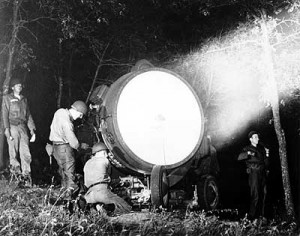
 RSS Feed
RSS Feed